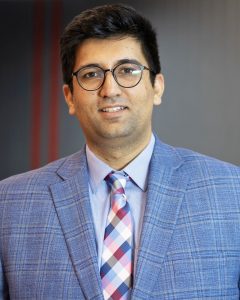 By Dr. Muhammad Ismail Khalid Yousaf
By Dr. Muhammad Ismail Khalid Yousaf
“Serve well and learn more—they’ve given you a place in their country, and it takes a big heart to do that,” my paternal grandmother, Jamila Begum, told me during our family’s ritual prayers before I left for the airport to begin my training in the United States. This 7,500-mile journey from Pakistan to Kentucky came with its own uncertainties and challenges, but the belief that “there is a blessing when you migrate to study abroad” was deeply rooted in my cultural and religious values. I was determined to carry forward these virtues with pride and dignity, as my parents had sacrificed everything to ensure I received the best training, and my wife’s support to get me to the United States to train was monumental. Thanks to the BridgeUSA J-1 Exchange Visitor Program, I was fortunate to match and start my training at the University of Louisville (“UofL”) School of Medicine’s Department of Neurology.
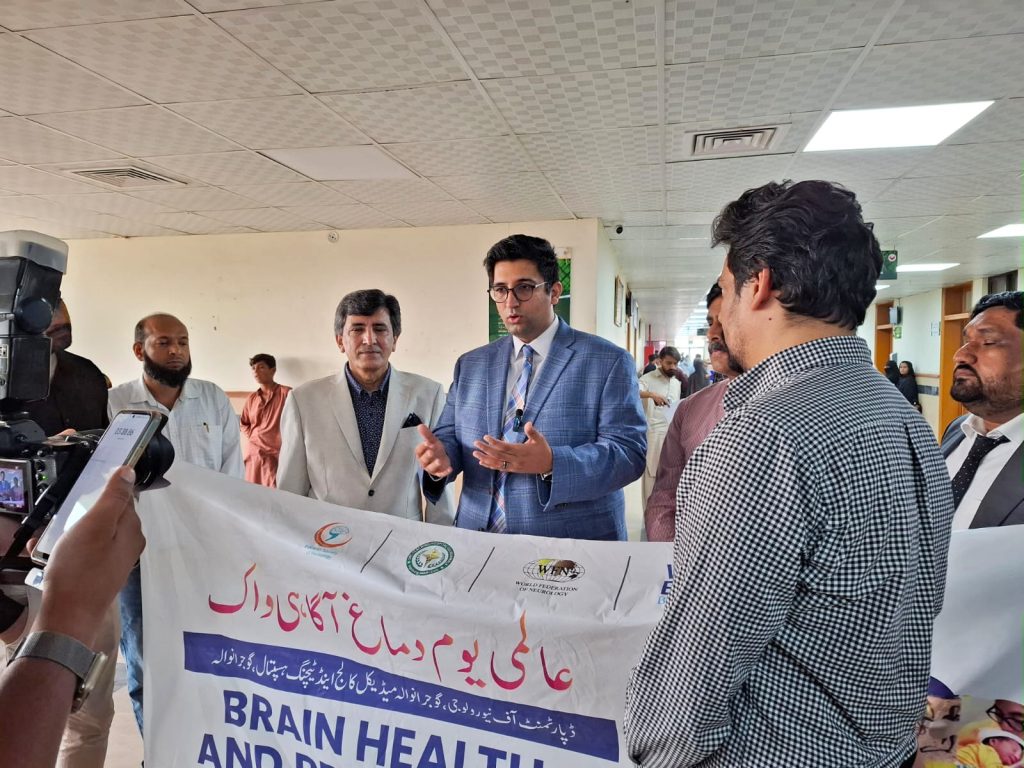
My first year in medicine was a steep and rapid learning curve. In addition to a strong focus on medical acumen, concepts like social work, physical and occupational therapy, and home health services were new to me, but I quickly saw how they contributed to patient recovery and holistic care. It was fascinating to witness how the entire hospital’s resources converged for the benefit of one patient. Evidence-based medicine was practiced at its finest, and my initial mindset of “patient first” evolved into “the patient is the center,” as we employed a multidisciplinary approach to ensure patient welfare was at the core of our efforts. When COVID-19 struck, it presented immense challenges, but it also deepened our resolve. Serving on the frontlines was difficult for my family and me, but we persevered, got vaccinated, and did our best. Looking back, we overcame the challenges and emerged with a renewed appreciation for all healthcare workers.
I also came to deeply appreciate the culture of zero tolerance for unprofessionalism, racism, or aggressive behavior, even in its passive-aggressive forms. Quality improvement projects were always in progress, and I was humbled to serve for two years on both the House Staff Committee and the Resident Quality and Assurance Committee, representing my department. This exposure broadened my understanding of how hospitals improve and why such metrics are critical for patient welfare. Under the mentorship of Dr. Palade and Dr. Hedera, both authorities in epilepsy and movement disorders, I channeled my learning into research, which culminated in multiple publications, earning me the “Most Published Resident” award. During this time, my resolve to give back also grew stronger.
A dear friend, Dr. Nawaz, who also came to the United States to train on the J-1 exchange visitor physician visa as a pediatrician, and I founded “SZAAPS” (Shaikh Zayed Al Nahyan Alumni-American Physicians Society) an alumni community for graduates from my medical college, SKZMDC (Shaikh Khalifa Bin Zayed Al-Nahyan Medical and Dental College) in Lahore, Pakistan. Through this platform, we aimed to help and guide these students and graduates through the process of applying for residencies. I interviewed residents, learned more about the system, and educated others. I traveled back to Pakistan to hold seminars and sessions and organized Zoom meetings for interview preparation. I was being trained, but I was also training others.
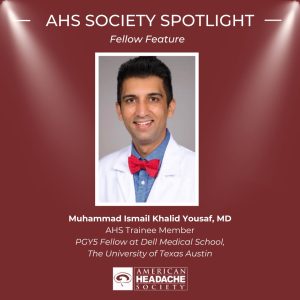
Today, SZAAPS is six years old, and by the grace of God, the hard work of the applicants, and the sacrifices of their parents, nearly 50 graduates from my medical college are now pursuing residencies and fellowships in the United States, most on the J-1 exchange visa, with their significant others on the J-2 visa as dependents. This outcome is unprecedented, and I’m incredibly proud. It all began with a small group; indeed, I was one of the first from my medical college alma mater to secure a J-1 visa and a residency in the United States, and this has helped open doors for others graduating from SKZMDC. Dr. Nawaz and I also started the “Pass the Torch” scholarship program, which helps future residents from humble backgrounds by covering their application fees, with the understanding that they will mentor two upcoming residents once they match.
During my chief resident year in UofL’s neurology program, I completed a mini-fellowship in clinical neurophysiology and attended multiple international conferences, thanks to scholarship programs. Meeting leaders in the field at these conferences was awe-inspiring, especially receiving feedback from people whose textbooks I had studied. It reinforced the truth behind what we write in our personal statements: “We want to train under the leaders in the field,” which is exactly what the U.S. healthcare system offers. Together with my fellow chief resident, Dr. Rosa, and UofL leadership, we created a new award—the “Chief Resident Advancement Award”—to recognize the hard work of PGY-1 and PGY-2 residents.
Louisville will always hold a special place in my heart. It’s where my two children, Jibran and Ayreen, were born. My wife and I were fortunate to have our parents visit from Pakistan to meet their grandchildren. The city’s diverse and hospitable culture made it feel like home, and we were deeply touched by how the community celebrated the arrival of our newborns. While living there, I also managed to cross off some bucket list items, like seeing Guns N’ Roses and Metallica live!
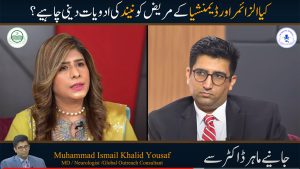
Next came my fellowship in headache medicine, with a special focus on pediatric headache. We moved to Austin, Texas, where we were again warmly welcomed, and I received top-notch training in this niche field. Headache medicine often carries stigma and lacks proper education. I was passionate about breaking these barriers—especially after becoming a parent and understanding how daunting a child’s pain can be. I had the privilege of volunteering with the Alliance for Headache Disorders Advocacy and the Global Patient Advocacy Coalition, working to reduce the stigma around headaches and advocate for patients. Representing Texas at “Headache on the Hill,” I engaged with Congressional and Senate offices to discuss headache patient advocacy, an effort highlighted by both the Texas Medical Association and the Travis County Medical Society. I also gave lectures on pediatric headaches in a mosque in Austin to promote further awareness.
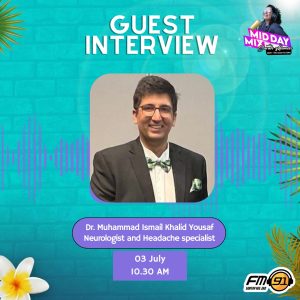
After excellent training under Dr. Irwin and Dr. Pavitt, and completing my five-year J-1 training tenure, I returned to my home country to give back, fulfilling a promise I made to myself five years ago. Since June 2024, I have organized several seminars in medical colleges and schools in Pakistan and worked with the Pakistan Society of Neurology and the Pakistan Headache Society. I was also appointed to the advisory committee of the Pakistan Headache Society for the 2024-2026 term. I have participated in podcasts to raise awareness about migraines and their epidemiology, and I have done media outreach by talking on FM 91 radio and nationally recognized channels like Express News, ABN News, News One, and City42, among others, to discuss mental health and headache advocacy. I also completed a seven-episode series with FM Sehat Zindagi, a Pakistani government healthcare outreach initiative, where I covered topics like dementia, headache, stroke, and pediatric mental health, to name a few. Based on the reaction and response these media appearances have garnered thus far, it is clear that the public is eager to learn more about this often-overlooked issue.
This wave of change in my specialty has been deeply meaningful to me, and I’m grateful for the opportunity to contribute my expertise to it. I continue to serve through virtual programs in media, writing health Op-Eds, and mentoring students, and I intend to keep doing so in the future with the unwavering support of my beautiful family.
Dr. Muhammad Ismail Khalid Yousaf is a returning author to Journeys in Medicine. Read his entry from 2022 here: Fear, Prayer, and the Unknown: First-time Parenthood in a Pandemic.
